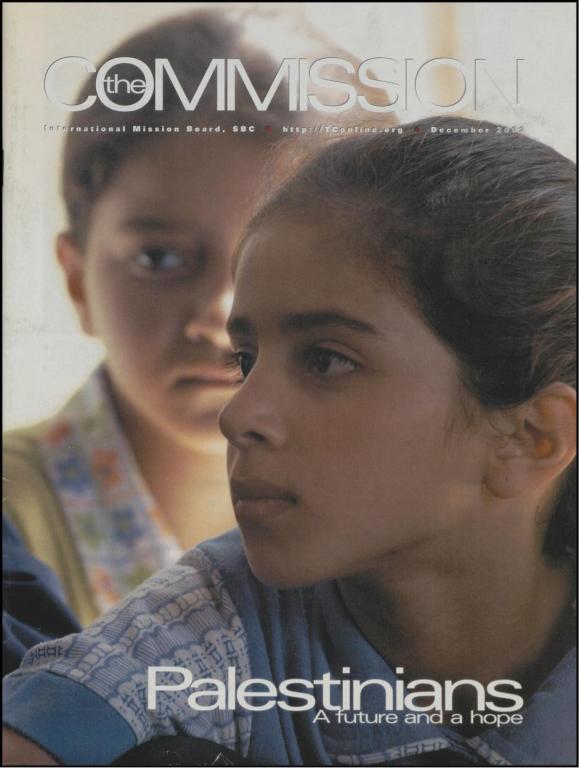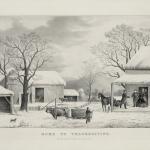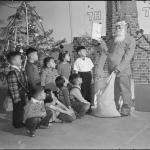This is the second post in a two-part series on the history Southern Baptist perceptions of Palestinians after the creation the state of Israel. Read the first part here.

It wasn’t until 2002 that Southern Baptists offered up official language for their majority pro-Zionist position, but a pro-Israel faction had been operating in SBC life for at least 20 years prior. At the same time Dean and Dona Fitzgerald were ministering in Gaza City on behalf of the Southern Baptist Convention’s Foreign Mission Board in the 1980s, Israeli political leaders were courting Southern Baptist conservatives who were in the process of strategically shifting the denomination politically rightward.
The most prominent Southern Baptist of the 1970s, President Jimmy Carter, stoked the fires of Zionist ire with his remarks in 1977 that the resolution to the “Palestinian problem” must include “a homeland for Palestinians.” Carter’s stance hastened hardline Israeli politicians to vie for US evangelical support. In what Maria Eleftheriadou describes as a joint effort between Jewish and evangelical right-wing lobbies, full-page ads appeared asserting evangelical support of Israel. One such effort, titled “Evangelical Concern for Israel,” appeared in the New York Times on November 1, 1977. The ad parroted Carter’s language: “We affirm as evangelicals our belief in the promised land to the Jewish people” and “would view with grave concern any effort to carve out of the Jewish homeland another nation or political entity.” W.A. Criswell, pastor of one of the most influential Southern Baptist churches in America and future SBC president, was one of the major signatories of the ad. In fact, as Daniel Hummel writes, the Zionist Likud leadership in Israel continually “reached out to the new conservative presidents [of the SBC],” convinced that “conservative Southern Baptist leaders were vital political players in the 1980s.” The relationship between the Likud party and Southern Baptist policy leaders would continue into the 1990s, including a meeting between Benjamin Netanyahu, Morris Chapman, and Richard Lee. According to Stephen Rock, this meeting was instrumental in mobilizing Southern Baptists and evangelicals more broadly to speak out against the enforcement of the Oslo Accords that would grant Palestinians a moderate level of autonomy in the West Bank and Gaza Strip.
A New Era in Baptist Zionism
Baptist Zionism was a central component of the Religious Right’s program in the 80s and 90s, bolstered by at least two assertions: 1) that the establishment of a Western democracy in the Middle East would assist in mission work and proselytizing, and 2) that the realization of an Israeli state was a fulfillment of biblical prophecy and a signpost for the return of Jesus Christ to the earth. At the turn of the 21st century, two shifts were set in motion that would complicate the approach to Palestinians among Baptist elites.
The first shift was cataclysmic. After 9/11, the Zionism of conservative evangelicals was energized by the Bush administration’s War on Terror and the accompanying massive jolt of anti-Arab, orientalist, and Islamophobic sentiments in American culture. The annual pastors’ conferences that the SBC held as part of their convention programming became sites of occasional anti-Islamic fervor. In 2002, pastor Jerry Vines made national headlines when he challenged religious pluralism in the US, singling out Muslims as people who venerate a prophet who was a “demon-possessed pedophile” and worship a god who will “turn you into a terrorist.” Five years later, Chuck Colson closed the pastors’ conference by warning Southern Baptist pastors that “Islam is a vicious evil” and a “theocracy” that believes only in conquest. Colson’s message used Islam and Islamism interchangeably, blurring the lines between different streams of Muslim belief and equating it all with terroristic zeal: “We will die for what we believe,” Colson preached, while “they [Islamists] will kill for what they believe.” When Prime Minister Ariel Sharon orchestrated the removal of Israeli settlements in the Gaza Strip as a show of good faith in Palestinian self-governance, Southwestern Baptist Theological Seminary president Paige Patterson scoffed at the decision, saying it was likely folly due to “the Palestinian temperament.”
The second was more gradual—the conservative realignment of the SBC began to take a decidedly Reformed and anti-dispensationalist turn at the top. The years of the George W. Bush presidency saw the flowering of an evangelical neo-Calvinist movement among Southern Baptist pastors and denominational influencers. The Calvinist rejection of dispensational theology meant that many Southern Baptist leaders left behind the prophetic importance of Israel for the Second Coming but kept many anti-Arab assumptions about Palestinians unexamined. The Southern Baptist Journal of Theology released a special issue dedicated to a Reformed Baptist perspective on Islam in 2004. Chad Brand’s essay for the journal sought to provide a context for Muslim militarism. Brand’s analysis concluded by attempting to assess the compatibility of Islam with Christianity and Western culture. For Brand, the latter two were synonymous. Christianity had created Western culture by championing three great Christian ideas: scientific progress, democracy, and the logic of capitalism. Brand concluded, “The question is whether Islam and the West can ever come to a rapprochement, considering that these [three] ideals are basically antithetical to the Muslim conception of God, authority, and morality. Time will tell. It will not be easy. Mutual respect is needed, but such respect seems unlikely to be mutual any time soon, given the current state of temper in the Islamic world.”
For many, Palestinians were the victims of Arab emotionalism and anti-Western irrationality made worse by the inherent extremism of Islamic belief. Palestinians were, in Albert Mohler’s words in 2012, people who lacked the responsibility necessary to achieve peace, and “who never seem to miss an opportunity to make their situation worse.” For leaders like the erstwhile Southern Baptist Russell Moore, supporting Israel was not about fulfilling end-times prophecy—as a Calvinist, Moore believed the destiny of Israel was fulfilled in the person of Jesus Christ. Rather, Moore argued that Southern Baptists should commit to supporting the national ambitions of a persecuted people and regarding with honor the “kinsmen according to the flesh of our Messiah.” Whatever seminary professors and entity heads might have thought about Israel and the end times, research from Lifeway suggests that as late as 2017, the average conservative evangelical in the pew still thought the modern state of Israel had a pivotal role to play in the unfolding of redemption history.
Some SBC leaders sought to inject nuance into Southern Baptist Zionism in the early years of America’s War on Terror. Richard Land, for instance, expressed concern about “Palestinian rights being trampled” by both Israelis and Palestinian political factions. Even while holding the party line on support for Israel, Land was insistent that Islam was not evil, that any killing in the name of religion was a blight on all religion, and that support for Israel was not “blind acceptance of everything the state of Israel does or has done.”
Yet, this theoretical reservation of the right to criticism, often repeated by Southern Baptist leaders, has yet to translate into significant critical response toward Israel’s anti-Palestinian policies, or even broader Southern Baptist awareness of Palestinians’ political and economic situation. If anything, Southern Baptist political opinion on the Middle East seems to have calcified in a post-9/11 landscape. In 2016, the SBC accepted a controversial resolution at their annual meeting related to “prayer and support for Israel.” The resolution revealed how closely aligned Southern Baptists were with America’s foreign policy interests, as well as Southern Baptists’ unique level of support for Israel compared to their US Protestant neighbors. The resolution stated that Southern Baptists were “concerned by anti-Israel activities in this country,” and committed Southern Baptists to “blessing” Israel, since God had promised Abraham in Genesis 12 that God would “bless those who bless you” and “curse those who treat you with contempt.”
Conversely, Israeli-Palestinian violence in the last two decades has brought Baptist missionaries and Baptists living in Israel and Palestinian territories back into view, as workers on both sides of the Gaza strip continue to plead with Baptists back in the US to pray for Israelis and Palestinians alike. Many of these missionaries had little time for the grand ambitions of the dispensationalists, nor for the political maneuvering of Southern Baptist leaders at home. They were more concerned with preserving life and sharing Christian hope with those living under the hail of gunfire. When the Israeli government removed Israeli settlers from Gaza in 2005, Bruce Mills, an American member of Jerusalem Baptist Church, spoke on behalf of that local church body in stating that they had “no stance as a body” on the settlement removals. Mills also chided American evangelical tourists who took a flippant posture toward military escalation in the region due to their own pet prophetic priorities. Missionary Ben Martin (pseudonym), who worked in Israel, urged Southern Baptists not to pick sides in a 2012 report from the Baptist Press. “This is not like a football game where we choose a side we’re for,” Martin said. When Israeli missiles killed three young boys in Gaza in 2014, missionaries were quick to condemn Hamas but even more concerned to relate the human cost of the war and the value of human life. Martin emphasized it was not a Jews vs. Palestinians situation, but an Israel vs. Hamas conflict. Rebecca Johnson, who was living in Gaza at the time, said it was the duty of Southern Baptists to pray for all caught up in the cycle of violence. “For God so loved the world—the ugly, me, you, Palestinians, Hamas, Israelis—so much that He gave His Son that we might have a relationship with him.”
A May 2021 piece from the SBC’s International Mission Board profiled Martin alongside another Southern Baptist working in Gaza. Both men spoke from the heart about the complexity of the ongoing conflict. Again, Martin reminded Southern Baptists that the politics of Christ prioritized the needy, which included both Palestinians and Israelis. “We don’t have to choose sides,” he said, remarking that there was “rightness and wrongness on both sides.” The Palestinian missionary echoed Martin’s sentiments, pointing out that fellow believers who were Arabs living in Gaza were constantly reminded of their second-class status in the region. Believers in the Gazan Church “yearn for freedom and autonomy but have little hope,” the missionary said. He added that missionaries working there saw it as part of their job to humanize their communities for a watching Southern Baptist constituency, to “represent the people groups involved as real people, created in the image of God, and not as the political puppets that the world uses to paint the picture of the Palestine-Israel conflict.”
Southern Baptist Identity at the Crossroads
Missionaries and the idea of mission work remained a constant force shaping Southern Baptist corporate identity throughout the twentieth century. Likewise, for the majority of the twentieth century, foreign missionaries and global evangelistic concerns were one of the forces shaping public opinion in Baptist life back home. While the former seems to have stood fast in the first quarter of the twenty-first century, the latter has faded. As Southern Baptist membership has become more and more closely aligned with the US Republican voting bloc, the apolitical chastening influence of missionaries on the ground, writing back home about their experiences and telling the stories of the people who suffer while the nations rage, has dissipated. Nowhere has this fact become clearer than in the rhetoric of Southern Baptist leaders over the last two months in the wake of the newest wave of Hamas attacks.
Just last week, SBC president Bart Barber appeared on News Nation’s CUOMO to talk about the state of the SBC, including the Baptist position on the political violence in Gaza and Israel. Southern Baptists, Barber said, supported Israel, but that did not necessarily include support for unbridled aggression: “Nobody’s writing a blank check in my congregation for Israel to do anything that they want to do.” But, Barber said, “It’s just that right now, we see that Israel’s actions that they’re taking seem to be actions that are proportional to the threat that they face.” Barber said that Southern Baptists weren’t pacifists, and that they “want to love everybody and serve everybody but also recognize that that sometimes nations have to take violent action to prevent violence.” Barber’s comments clearly asserted that Baptists’ evangelistic mission to Palestinians and political, theological, and moral support for Israeli military action in Gaza were not at odds with one another. One wonders, however, if host Chris Cuomo interviewed the long-term Baptist missionaries who have served in Gaza and among Palestinians over the course of the last half-century, if they would say otherwise.













